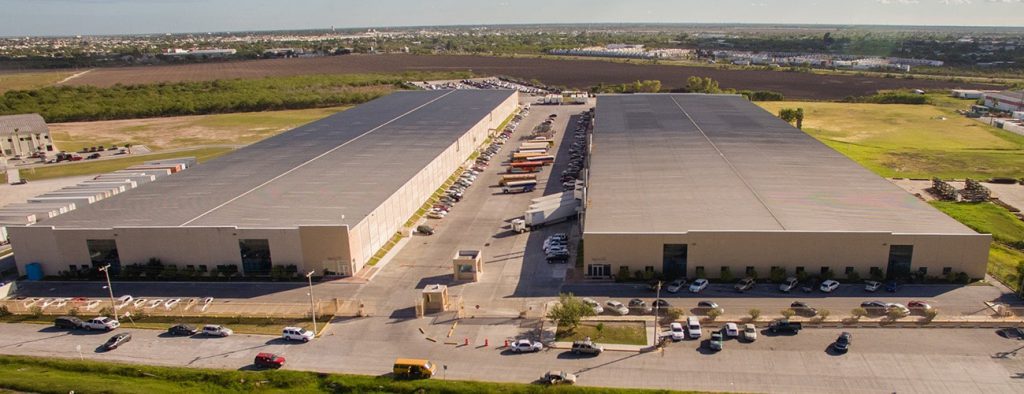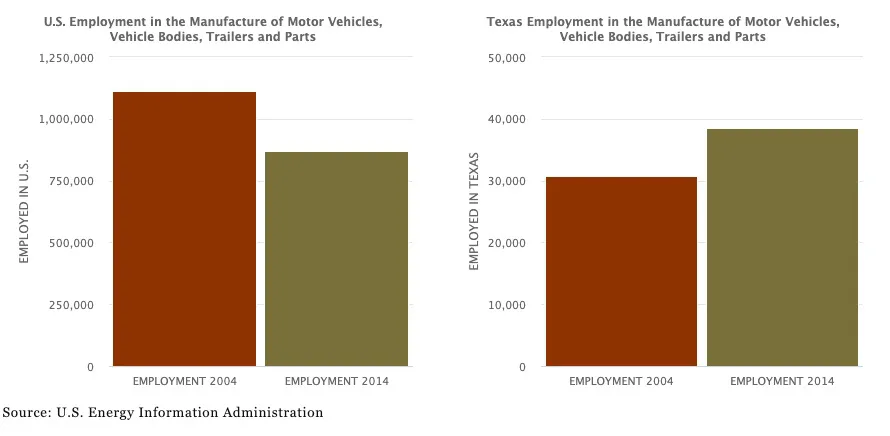Last Updated on April 1, 2024

Texas, the second-largest state in the U.S., is known for its oil and gas prowess. However, in recent years, manufacturing companies in Texas have emerged as a driving force behind the states' economic growth. This article delves into the thriving manufacturing sector and explores how companies are reshaping the Lone Star State's economic landscape.
Strategic Location and a Business-Friendly Environment
Texas boasts a strategic location, bordering Mexico and offering access to major trade routes. This, coupled with a business-friendly environment that prioritizes deregulation and lower taxes, creates fertile ground for manufacturers. Imagine being a factory owner in Texas: they can access international markets easily, while also benefiting from a tax structure that allows them to reinvest profits back into their operations. This combination is a win-win for both businesses and the state's economy.
Automotive Dominance

Source: Texas Comptroller
The automotive industry has played a pivotal role in Texas' manufacturing resurgence. Companies like Toyota, General Motors, and Tesla have established major production facilities in the state. These automotive giants have not only created thousands of jobs but also catalyzed the growth of supporting industries, such as parts suppliers and logistics providers. The number of Americans employed in automotive manufacturing has declined significantly in the past ten years, but has risen in Texas.
Sharing the longest border with Mexico of any U.S. state, Texas has become an important part of the realigned North American “auto alley,” now running north from Mexico through a number of southern U.S.
Texas A&M University
states, to the Midwest rust belt.
Embracing the Future
Furthermore, Texas has positioned itself at the forefront of emerging technologies. The state has attracted numerous high-tech manufacturing companies, including those specializing in semiconductor production, aerospace engineering, and renewable energy. These cutting-edge industries contribute to state economic growth but also foster innovation and drive technological advancements.
Workforce Development: A Key Priority
One of the key factors behind Texas' manufacturing success is its commitment to workforce development. The state has invested heavily in vocational training programs and partnerships with educational institutions to ensure a steady supply of skilled workers. This proactive approach has enabled manufacturing companies to access a talented pool of employees, ensuring continued growth and competitiveness.
Economic Impact: Ripple Effects
Manufacturing companies in Texas impact far beyond the factories themselves. These businesses have created a ripple effect, stimulating growth in ancillary industries such as transportation, logistics, and professional services. This economic multiplier effect has contributed to job creation, increased tax revenue, and overall prosperity for communities across the state.
Austin has been a tech hub for decades, even being hailed as the next Silicon Valley. Approximately 52,700 IT professionals worked in the city in 2023, employed by companies like Apple, Amazon, Tesla, Expedia Group and RetailMeNot, Inc. Tech businesses are also seeing the talent available in surrounding cities like Temple, TX.
The ripple effect of this industry’s growth extends beyond Austin’s city limits, bringing the tech boom to other communities in Central Texas, like Temple. In 2022, Meta announced plans to establish an $800 million hyperscale data center in Temple — a 900,000 square-foot facility that will support approximately 100 jobs upon completion. The following year, Samsung announced it would establish a $17 billion semiconductor manufacturing facility in neighboring Taylor, TX — a move that is expected to create more than 2,000 high-tech jobs in the region.
Temple EDC
Sustainability and Environmental Considerations
As the manufacturing sector thrives, companies in Texas are also prioritizing sustainability and environmental responsibility. Many firms have adopted green manufacturing practices, investing in energy-efficient technologies and implementing waste reduction strategies. This commitment to sustainable operations benefits the environment but also positions these companies as leaders on the global market.
To promote Sustainability, the Texas government has implemented various initiatives and regulations. The state offers incentives and tax credits for businesses adopting sustainable practices, encouraging investments in clean technologies. Furthermore, the Texas Emissions Reduction Plan (TERP) aims to reduce air pollution from industrial sources, fostering a cleaner and healthier environment.
McBride Sustainability
Conclusion: Texas Reputation as a Manufacturing Powerhouse Is Solidified
Texas' manufacturing prowess is a testament to the state's business-friendly climate, skilled workforce, and strategic location. As manufacturing companies in Texas continue to drive innovation, create jobs, and contribute to economic growth, the state's reputation as a manufacturing powerhouse is solidified. The future looks bright for the Lone Star State's manufacturing sector. Its impact on the state's economy is poised to resonate for years to come.
FAQs Manufacturing Companies in Texas
What industries dominate the manufacturing sector in Texas? The automotive, technology, aerospace, and energy industries are among the most prominent players in Texas' manufacturing landscape.
How has Texas supported the growth of manufacturing companies? Texas has implemented business-friendly policies, invested in workforce development programs, and fostered a pro-business environment to attract and retain manufacturing companies.
What role does innovation play in Texas' manufacturing sector? Innovation is a key driver, with companies in industries like semiconductors, renewable energy, and aerospace engineering pushing the boundaries of technology and shaping the future of manufacturing.
How do manufacturing companies contribute to the broader Texas economy? Manufacturing companies create jobs, spur growth in supporting industries, generate tax revenue, and contribute to overall economic prosperity throughout the state.
What steps are manufacturing companies in Texas taking to prioritize sustainability? Many companies have adopted green manufacturing practices, investing in energy-efficient technologies, implementing waste reduction strategies, and prioritizing environmental responsibility.
About NovaLink
As a manufacturer in Mexico, NovaLink employs a unique approach that transcends the traditional model of shelter production. More than just the location of your manufacturing, we would like to become a partner in your manufacturing in Mexico. You will be able to relocate or initiate manufacturing for your company in Mexico in a low-cost labor environment with very little delay or up-front costs. Find out how we can help you by handling the manufacturing process.
There are NovaLink facilities in the border cities of Brownsville, Texas, Matamoros, Mexico, and Saltillo, Mexico.
Explore More: Discover Related Blog Posts
Expand your knowledge and delve deeper into more information about Texas and Mexico manufacturing with our curated collection of related blog posts.
- Top 10 Reasons to Move Your Manufacturing Operations to Mexico
- Strengthening Your Supply Chain: How Texas Manufacturing Companies Benefit from Mexican Partnerships
- Maximizing the USMCA Advantage: Texas Manufacturers Partnering with Mexico
- Closer to Home: Why Texas is a Prime Location for Nearshoring Manufacturing
- Strategic Shifts: Texas Manufacturing Companies and the Nearshoring Movement